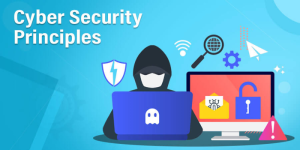In an increasingly digital world, cybersecurity is a critical responsibility for individuals, businesses, and governments. Cybercriminals’ strategies for exploiting weaknesses advance in lockstep with technology. Understanding the need of cybersecurity and the main principles of cybersecurity is crucial for protecting sensitive data and ensuring the safety of digital assets. In this blog post, we will delve into the key principles of cybersecurity and explore how they contribute to safeguarding against cyber threats. Enrolling in a Cyber Security Course in Pondicherry at FITA Academy can provide valuable insights into these principles and enhance your ability to mitigate cyber risks effectively.
Key Principles of Cybersecurity
Risk Management
Effective cybersecurity begins with identifying, assessing, and mitigating risks. Risk management involves evaluating potential threats and vulnerabilities to determine the likelihood of a cybersecurity incident occurring and its potential cyberimpact. By prioritizing risks and implementing appropriate controls, organizations can minimize their exposure to cyber threats.
Defence in Depth
The principle of defence in depth emphasizes the importance of implementing multiple layers of security measures to protect against various types of cyber threats. This approach involves deploying a combination of technical controls, such as firewalls, antivirus software, and intrusion detection systems, as well as implementing policies and procedures to mitigate human error and insider threats. Upgrade your skills in the Cyber Security course in Coimbatore can provide comprehensive training on these strategies and help individuals develop expertise in safeguarding digital assets.
Least Privilege
The principle of least privilege, one of the fundamental cyber security principles, advocates for granting users only the minimal level of access required to accomplish their job tasks. By limiting user permissions and privileges, organizations can reduce the risk of unauthorized access to sensitive data and systems. Implementing least-privilege access controls helps prevent insider threats and unauthorized access by cybercriminals.
Continuous Monitoring
Cyber threats are constantly evolving, making continuous monitoring essential for detecting and responding to security incidents in real time. By observing network traffic, system logs, and user activity, organizations can identify suspicious behaviou and potential security breaches. Continuous monitoring allows for timely incident response and mitigation, minimizing the impact of cyber attacks. For those seeking a Cyber Security Course in Madurai, it offers the opportunity to acquire the skills necessary for proficiently implementing and managing continuous monitoring systems.
Encryption
Encryption is a fundamental cybersecurity principles that involves converting sensitive data into ciphertext to protect it from unauthorized access. By encrypting data both in transit and at rest, organizations can ensure confidentiality and integrity, even if the data is intercepted or compromised. Strong encryption algorithms and key management practices are essential for effective data protection.
Finally, understanding the main principles of cybersecurity is essential for effectively mitigating cyber threats and safeguarding digital assets. By recognizing the importance of cybersecurity and adopting a risk-based approach, implementing defense in-depth measures, and adhering to principles such as least privilege and encryption, Organizations may improve their security posture and minimize the likelihood of a successful cyberattack. Continuous monitoring and proactive incident response are also critical components of a robust cybersecurity strategy. By prioritizing cybersecurity and adhering to these principles, individuals and organizations can mitigate risks and protect against the ever-evolving threat landscape of cyberspace. Enrolling in a Cyber Security Course in Hyderabad can further enhance understanding and application of these principles, empowering individuals to effectively contribute to cybersecurity efforts.

